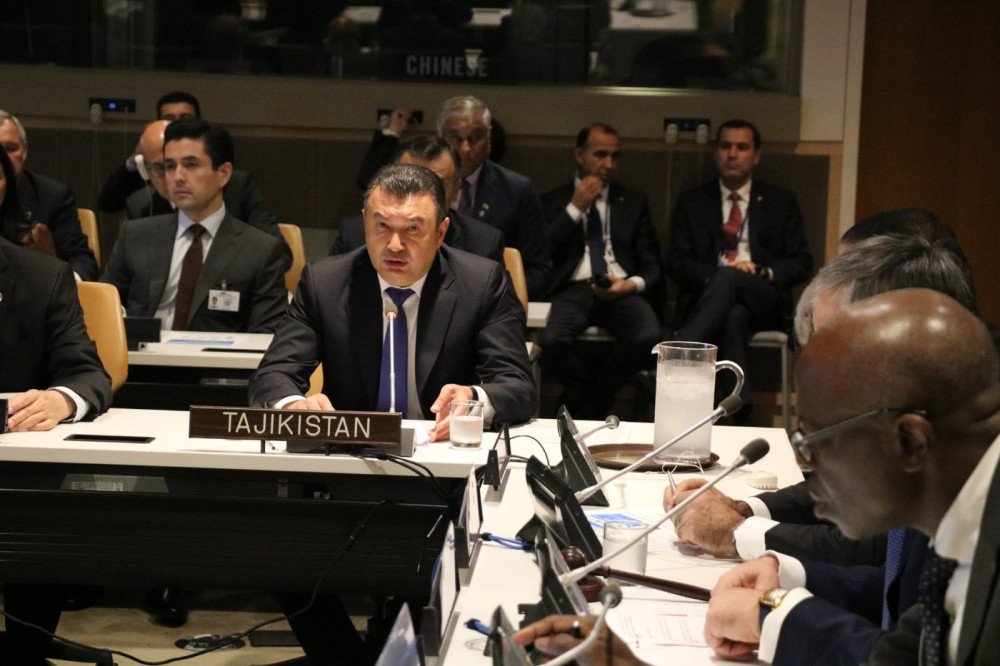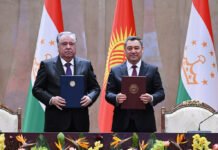The UN is pleased with the outcome of the Summit on Climate, which ended the day before in New York, but it is urged not to stop there. Dozens of countries, more than a hundred cities, including several megacities, as well as representatives of large businesses, announced specific steps to combat the climate crisis.
At the 74th session of the UN General Assembly, which was attended by representatives of more than 190 countries, the delegation of the Republic of Tajikistan was headed by Prime Minister Kohir Rasulzoda. The head of the Tajik delegation, speaking along with representatives of other countries and international organizations at the conference and meetings, noted the initiatives of regional and global level in Tajikistan in the field of climate protection, including water and environment.
For the Republic of Tajikistan, which is at the source of the main transboundary rivers in the Central Asian region, issues related to the prevention of water-related disasters and the elimination of their consequences are of great importance. Central Asia has an important geopolitical significance and the processes taking place in the region influence the development of many countries and other regions. Solving the existing problems in the field of mitigation of the negative consequences of climate change, in the conditions of global development, requires collective efforts, implementation of urgent and long-term measures.
According to the Prime Minister of Tajikistan, the country has seen a significant reduction in the area of glaciers over the past decade, which are of vital importance for the entire Central Asia. We believe it is necessary to strengthen cooperation between the countries to eliminate the consequences of natural disasters through the development of preventive measures and the establishment of appropriate funds to assist countries in need,” Rasulzoda said, “Only as a result of natural disasters related to water, the economy of our country is damaged by hundreds of millions of dollars annually. Frequently, natural disasters are accompanied by human casualties. The negative impact of climate change on the quantity and quality of freshwater resources in the world is becoming increasingly evident. In this regard, he called on countries to strengthen cooperation in preventing and mitigating the effects of natural disasters.
The Prime Minister focused on the second conference on the implementation of the International Decade for Action “Water for Sustainable Development” to be held in June 2020 in Dushanbe under the slogan “Stimulating actions on water and partnership at the local, national, regional and global levels”. He expressed hope for support and active participation of UN member-states.

The problem of glacier melting, including in the territory of Tajikistan, today is relevant for the entire world community. Their protection, monitoring and preservation is a regional and international problem, therefore, it should not be only a problem of Tajikistan. Therefore, our country pays special attention to water problems.
As it was reported in the Ministry of Foreign Affairs of the Republic of Tajikistan, on the margins of the 74th session of the UN General Assembly in New York on the initiative of the Republic of Tajikistan, a high level side event was held on the theme of “Water Transformation Actions to Accelerate Achievement of Global Goals related to Climate Change”. This event was organized by Tajikistan in cooperation with Fiji, Canada, Morocco, Portugal, the Russian Federation, Singapore, Switzerland, and the UN Department of Economic and Social Affairs, which was attended by representatives and experts of UN member countries and international organizations.
In his speech, Mr. Kohir Rasulzoda introduced the participants to the efforts of Tajikistan in the field of water resources and climate change, the process of implementation of the International Decade for Action “Water for Sustainable Development, 2018-2028”, the preparation of the second International High-Level Conference on the implementation of the Decade of Action, which will be held in Dushanbe in 2020. In this regard, the Prime Minister of Tajikistan invited representatives of UN member states to take an active part in the conference. According to the Tajik Prime Minister, only the UN can coordinate and unite the efforts of the entire international community to address these challenges.
In conclusion, Rasulzoda noted the most important modern problems from the point of view of Tajikistan. According to him, these are “climate change, environmental degradation, acute shortage of resources, and the widening gap between poor and rich countries and strata of the population”.
It should also be noted that environmental problems sometimes translate into political attitudes and lead to difficult situations in high-level negotiations. The Regional Environmental Centre for Central Asia (CAREC), which is an international partner of the United Nations Agency for International Development (USAID), has decided to focus on regional cooperation in view of its extensive environmental coverage. Zafar Mahmudov, Executive Director of CAREC, said in his interview: “We decided to create many platforms for dialogue and exchange of experience between the regions of our country, which will accelerate the development of specific solutions to individual issues. Then we would like to transfer this model to the international level, where we hope to achieve good results.
According to the prime minister, it is necessary to encourage the development of a green economy, in particular green energy, as an important vector of sustainable development. “Widespread use of renewable energy, mainly hydropower, contributes to the economic and social development of the country with the lowest emissions. The country’s energy sector is based on hydroelectric power plants, which produce about 98% of its electricity,” a Tajik spokesman said.
The government of the Republic of Tajikistan is taking comprehensive measures to balance energy production and consumption by modernising and increasing the capacity of existing hydroelectric power plants, constructing new hydroelectric power plants and introducing modern energy-saving methods.
Shahnaz Kamilzada, Journalist
Join us in Telegram! Be aware of all news! https://t.me/sugdnewss






